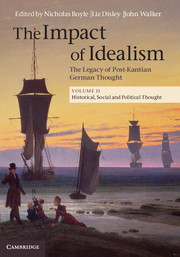Book contents
- Frontmatter
- Contents
- List of Contributors
- Acknowledgements
- List of Abbreviations
- Introduction: Idealism in historical, social and political thought
- 1 From transcendental idealism to political realism
- 2 The public of the intellectuals – from Kant to Lyotard
- 3 Idealism and the idea of a constitution
- 4 German Idealism and Marx
- 5 Ethos, nature and education in Johann Erich von Berger and Friedrich Adolf Trendelenburg
- 6 The concept and philosophy of culture in Neo-Kantianism
- 7 After materialism – reflections of Idealism in Lebensphilosophie: Dilthey, Bergson and Simmel
- 8 ‘Rationalisation’, ‘reification’, ‘instrumental reason’
- 9 Freedom within nature: Adorno on the idea of reason's autonomy
- 10 German neo-Hegelianism and a plea for another Hegel
- 11 Idealism and the fascist corporative state
- 12 Love and recognition in Fichte and the alternative position of de Beauvoir
- 13 Hegel's concept of recognition and its reception in the humanist feminism of Simone de Beauvoir
- 14 Giving an account of oneself amongst others: Hegel, Judith Butler and social ontology
- 15 Idealism in the German tradition of meta-history
- Bibliography
- Index
- References
3 - Idealism and the idea of a constitution
Published online by Cambridge University Press: 05 December 2013
- Frontmatter
- Contents
- List of Contributors
- Acknowledgements
- List of Abbreviations
- Introduction: Idealism in historical, social and political thought
- 1 From transcendental idealism to political realism
- 2 The public of the intellectuals – from Kant to Lyotard
- 3 Idealism and the idea of a constitution
- 4 German Idealism and Marx
- 5 Ethos, nature and education in Johann Erich von Berger and Friedrich Adolf Trendelenburg
- 6 The concept and philosophy of culture in Neo-Kantianism
- 7 After materialism – reflections of Idealism in Lebensphilosophie: Dilthey, Bergson and Simmel
- 8 ‘Rationalisation’, ‘reification’, ‘instrumental reason’
- 9 Freedom within nature: Adorno on the idea of reason's autonomy
- 10 German neo-Hegelianism and a plea for another Hegel
- 11 Idealism and the fascist corporative state
- 12 Love and recognition in Fichte and the alternative position of de Beauvoir
- 13 Hegel's concept of recognition and its reception in the humanist feminism of Simone de Beauvoir
- 14 Giving an account of oneself amongst others: Hegel, Judith Butler and social ontology
- 15 Idealism in the German tradition of meta-history
- Bibliography
- Index
- References
Summary
The Enlightenment and sociological formation of power
The Enlightenment, observed both as a historical and as a conceptual event, had its centre in the conviction that the European state needed to be constructed as a state under law. As a result, the legitimating function of the constitution was a matter of intense political concern for the Enlightenment. Most essentially, the Enlightenment converged around the view that a state could only be seen as legitimate if it was defined by a legal personality (a constitution), which distinguished acts of public will from acts of factual bearers of political authority and from all transient and particular interests seeking access to state power. Underlying the politics of Enlightenment, thus, was the general normative insistence that the state had to be constructed as a categorically public order, whose primary laws distinguished its power from all privately owned and exercised power, and constructed its authority as a sui generis resource, clearly separated from other spheres of social exchange.
This emphasis on constitutional formation was expressed in the political theories of the Enlightenment. Gaining momentum after Hobbes, the attempt to separate the state, under the public-legal order of a constitution, from mere acts of government unified all the diverse stances broadly categorised as reflecting the Enlightenment. Yet this emphasis was also evident in the practice of the Enlightenment. The most important reflection of this was in the tendency towards the codification of the legal system that was prevalent throughout Europe in the eighteenth century. The drive to codification was also motivated by the idea that the state could only be legitimate if it was framed by a single legal corpus, through which it ordered its relations with other societal actors. Indeed, the core Enlightenment concept of natural rights played a vital role in this process of codification, and the construction of natural rights became the basis for the formation of the state as an abstracted legal person.
- Type
- Chapter
- Information
- The Impact of IdealismThe Legacy of Post-Kantian German Thought, pp. 51 - 81Publisher: Cambridge University PressPrint publication year: 2013
References
- 3
- Cited by



